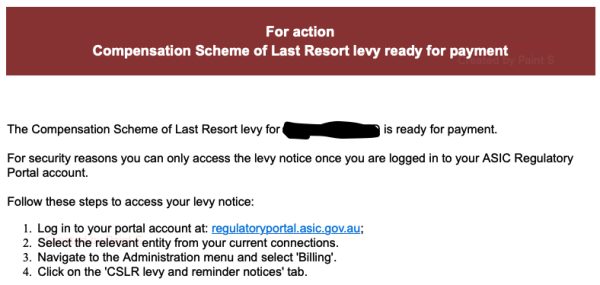FAAA urges early ASIC intervention, not interference

The financial services regulatory regime should place more focus on early intervention to avoid major issues and less focus on interfering with the efficient operation of well-intentioned businesses, according the Financial Advice Association of Australia (FAAA).
The FAAA has told the Australian Securities and Investments Commission (ASIC) that the recent collapses of a number of managed investment schemes and other investments has placed a spotlight on the importance of regulatory oversight and early intervention.
As well, the FAAA has told ASIC that it needs to do more than just talk about regulatory reform in circumstances where prior consultations (in 2020) have resulted in nothing tangible happening.
It has also sent a clear message that the shape of the financial advice profession since the Royal Commission demands that ASIC “should adapt to this new environment by re-framing its regulatory guidance for the financial advice sector, pitching the guidance at the increased audience of financial advisers that now rely directly on their own readings of ASIC’s guidance.
Responding to ASIC’s consultation around Regulatory Simplification, the FAAA said that whilst law reform and other changes are likely to be necessary to address a number of gaps that have been identified, the existing law does enable appropriate enforcement to a significant extent.
“It is our view that the regulatory regime should place more focus on early intervention to avoid major issues and less focus on interfering with the efficient operation of well-intentioned businesses,” it said. “It is important that strong regulatory enforcement action is taken with respect to these matters to provide a clear message to strongly discourage similar conduct in the future.”
“It is important that ASIC takes meaningful action as a result of this consultation. In November 2020, ASIC released Consultation Paper 332 on Promoting access to affordable advice for consumers. In total 466 submissions were received from financial advisers, licensees, associations and other relevant stakeholders in response to this consultation,” the FAAA said.
“To the best of our understanding, very little reform occurred as a result of this consultation. Whilst some of the ideas were passed on to the Quality of Advice Review, it seems to those who did so much work on CP 332, that very little actually happened. It is essential that meaningful change flows from this consultation.”
The FAAA also used its response to the ASIC consultation to point to disproportionate pecuniary penalties particularly with respect to what represent minor and technical misdemeanours.
“An example recently is AFSLs being fined more than $30,000 for what amounts to a misunderstanding, leading to an administration mistake when authorising and registering new authorised representatives. This mistake is generally unintended and a consequence of a transitional legislative arrangement resulting in an illogical double ASIC notification requirement,” it said.











Far to sensible for ASIC to listen too or act on
Arrogant
Secretive
Incompetent &
Corrupt
“An example recently is AFSLs being fined more than $30,000 for what amounts to a misunderstanding, leading to an administration mistake when authorising and registering new authorised representatives. This mistake is generally unintended and a consequence of a transitional legislative arrangement resulting in an illogical double ASIC notification requirement,” it said.
This tells you everything you need to know about ASIC.
Ridiculous red tape and a willingness to smash small financial advice practices around with big fines for no consumer detriment admin errors.
Meanwhile a super fund trustee misleads 2,000 members and gets a similar fine.
There is something desperately wrong with ASIC – needs to be ripped apart and rebuilt.
Good on the FAAA for having a dip – I think the adviser community is well fed up with them. Until they can get their own house in order, they should be quiet.
Clearly the architects of this debacle (I.e. owners of Shield) , and the funds that we’re looking to benefit the most should be held to be the most accountable for this fraud. ASIC needs to understand that Advisers are not at the top of the food chain in these instances and depending on their experience in the industry could also be victims of these incidents.
The architects who are also their employer have often lied to the advisers involved and implemented workplace practices that may seem to be, or they are told are acceptable. An employer has great power and authority over their workers/advisers. I could understand if you are new to the industry you place a certain amount of trust in your employer to give you guidance. I say this because as a young bank adviser I trusted the guidance of the banks culture, policy and procedures believing that they would guide me honestly and ethically.
When we look back through the Royal Commission we see many of their practices we thought were Ok turned out to be unethical and these have since been changed.
I see the same now happening with vertically aligned Industry Funds where the public aren’t being given a fair chance to seek unbiased retirement advice as the trade union / Labour Party linked funds lobby for greater powers to make the public believe that they will give their clients choice, and true unbiased advice when in reality they have continued to simply hold members funds in their own products and resist true independent comprehensive advice.
These products take a sizeable chunk of fees for this privilege of holding Australians retirement savings for doing very little.
Their practices are no different to the culture of the major banks that were pushed out of the industry for this very same behaviour and culture.
Unfortunately these funds have the backing of the trade unions and the government that are telling their advisers that what they are doing as independent product manufacturers is Ok.
They have been told ( by employer, ASIC, & labour Govt) that it’s Ok to play both sides of the fence as the Product Provider and unbiased adviser at the same time.
The labour government and the regulator ASIC seem to be wilfully blind to this double standard of Ethics in the Industry Fund space. At the same time they want to target and lay the lions share of the blame on advisers who in many cases are also the victims of their employers practices, policies, and procedures as we see with the overall culture of Industry Fund product manufacturers. We currently see they are aiming to also become advisers as well as trustees of a product manufacturer who only recommend only a single super product to the public, which totally ignores the complexity of advice required at this stage of an Australian retirees life.
The public have put their trust in the ethical standards of a product manufacturer and the regulator to look after their interests, but
the advisers caught working for these organisations are also victims of this unethical dilemma as the bank advisers were in the past.
ASIC, the labour government, and the union based Product Providers seem to have a very cosy relationship in relation to these unethical practices which they refuse to acknowledge despite pushing the major banks out of the industry for the very same practices. So when their advisers are challenged by the public will the regulator again throw the advisers to the wolves and scapegoat them or will they take responsibility for the unethical practices here which they and the labour government clearly endorse, along with the trustees and employers within these vertically aligned product providers??
All very true of course.
A fund manager expanding into New Zealand told me that she went to the pub after an event and the regulator, her and her team, and a group of Financial Advisers sat arond the table, had dinner and a few drinks, and spoke about how they could launch there offering in NZ and also the Advisers were talking about the best ways to protect New Zealanders for most of the night. It was all friendly, efficient and all in the sprirt of trying to do the right things for mum’s and dads.
She then said..”what a totally different attitude in Australia we experienced, I suspect in Australia, they’d put you in jail and then ask questions, probably the most adversarial regulator in the world”
I think that sums it all up..and consumers are paying.